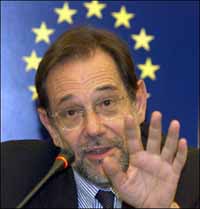Six leading countries to consider possibility for Iran to keep partial nuclear program
Iran's top nuclear envoy said Wednesday he expected "new ideas" from a senior EU official at talks on resolving the deadlock between Tehran's refusal to freeze its uranium enrichment program and U.N Security Council demands that it do so.

"There are supposed to be new ideas introduced, and that's why we are here," Ali Larijani told reporters, ahead of a meeting scheduled later Wednesday with Javier Solana, the European Union's senior foreign policy official. He added, however, that he was "not aware of the (specific) supposed initiatives to be made."
His remarks suggested that Solana - representing the United States, Russia, China, Britain, France and Germany - might be coming to the table with a new formulation on the demanded enrichment freeze.
On the eve of the talks, foreign government officials told The Associated Press that the six powers may be willing to allow Iran to keep some of its uranium enrichment program intact instead of demanding it be completely dismantled.
Recognizing that Iran would never accept a complete freeze, the powers are considering "a new definition of enrichment," one diplomat said, that could allow Iran to keep some of its program intact without actually producing enriched uranium.
State Department spokesman Sean McCormack denied that the United States was "considering any proposals that would allow the Iranians to retain any enrichment-related activities."
But another U.S. official who spoke on condition of anonymity suggested there was potentially more flexibility in Washington's position than previously.
"We purposely left open the possibility that direct talks could happen by being a little less committed to the requirements to have a meeting," said the official. He alluded to previous demands of an all-encompassing freeze on all enrichment related activities.
Iran is running more than 1,300 centrifuge machines at its underground facility at Natanz. Its ultimate goal is to run 50,000 centrifuges a year, enough to churn out material for a network of nuclear power generators - or a full-scale nuclear weapons program.
The United States might accept allowing a set number of centrifuges to remain standing and assembled in series but not running, a diplomat said. Iran, he said, would likely push for keeping the machines operating, if not producing enriched uranium.
The six powers also want to reduce assembled and hooked-up centrifuges to less than 1,000.
Subscribe to Pravda.Ru Telegram channel, Facebook, RSS!


